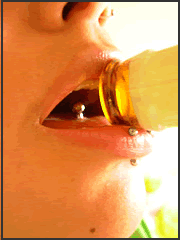Published: February 23, 2010

© iStock
While the otherworldly behavior of teenagers is well documented,
University of Pittsburgh researchers have taken a significant step toward finally unraveling the actual brain activity that can drive adolescents to engage in impulsive, self-indulgent, or self-destructive behavior. Published in the current edition of
“Behavioral Neuroscience,” the Pitt study demonstrates that adolescent brains are more sensitive to internal and environmental factors than adult brains and suggests that the teenage tendency to experiment with drugs and develop psychological disorders could stem from this susceptibility.
[continue reading…]
Published: March 24, 2008
 How can researchers track where teens go when not in or near home or school to see if this movement has an impact on health-related behavior such as smoking or sexual activity” The answer is through that ubiquitous teen accessory – the cell phone.In a paper published in the April issue of the Journal of Adolescent Health researchers from Indiana University School of Medicine report on a pilot study which evaluated the feasibility of using global position system -enabled cell phones to track where 14- to 16-year-old girls spent their time. [continue reading…]
How can researchers track where teens go when not in or near home or school to see if this movement has an impact on health-related behavior such as smoking or sexual activity” The answer is through that ubiquitous teen accessory – the cell phone.In a paper published in the April issue of the Journal of Adolescent Health researchers from Indiana University School of Medicine report on a pilot study which evaluated the feasibility of using global position system -enabled cell phones to track where 14- to 16-year-old girls spent their time. [continue reading…]


 How can researchers track where teens go when not in or near home or school to see if this movement has an impact on health-related behavior such as smoking or sexual activity” The answer is through that ubiquitous teen accessory – the cell phone.In a paper published in the April issue of the Journal of Adolescent Health researchers from Indiana University School of Medicine report on a pilot study which evaluated the feasibility of using global position system -enabled cell phones to track where 14- to 16-year-old girls spent their time. [continue reading…]
How can researchers track where teens go when not in or near home or school to see if this movement has an impact on health-related behavior such as smoking or sexual activity” The answer is through that ubiquitous teen accessory – the cell phone.In a paper published in the April issue of the Journal of Adolescent Health researchers from Indiana University School of Medicine report on a pilot study which evaluated the feasibility of using global position system -enabled cell phones to track where 14- to 16-year-old girls spent their time. [continue reading…]